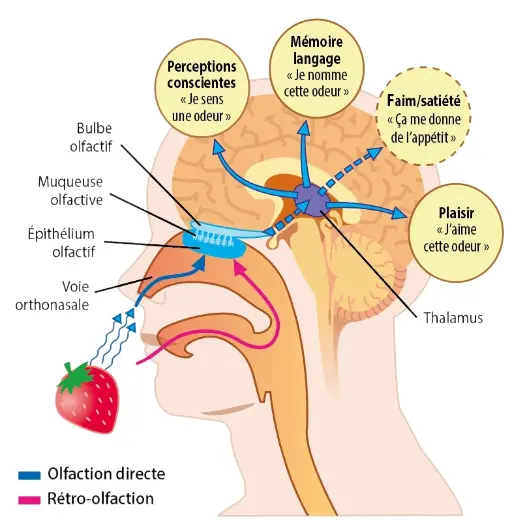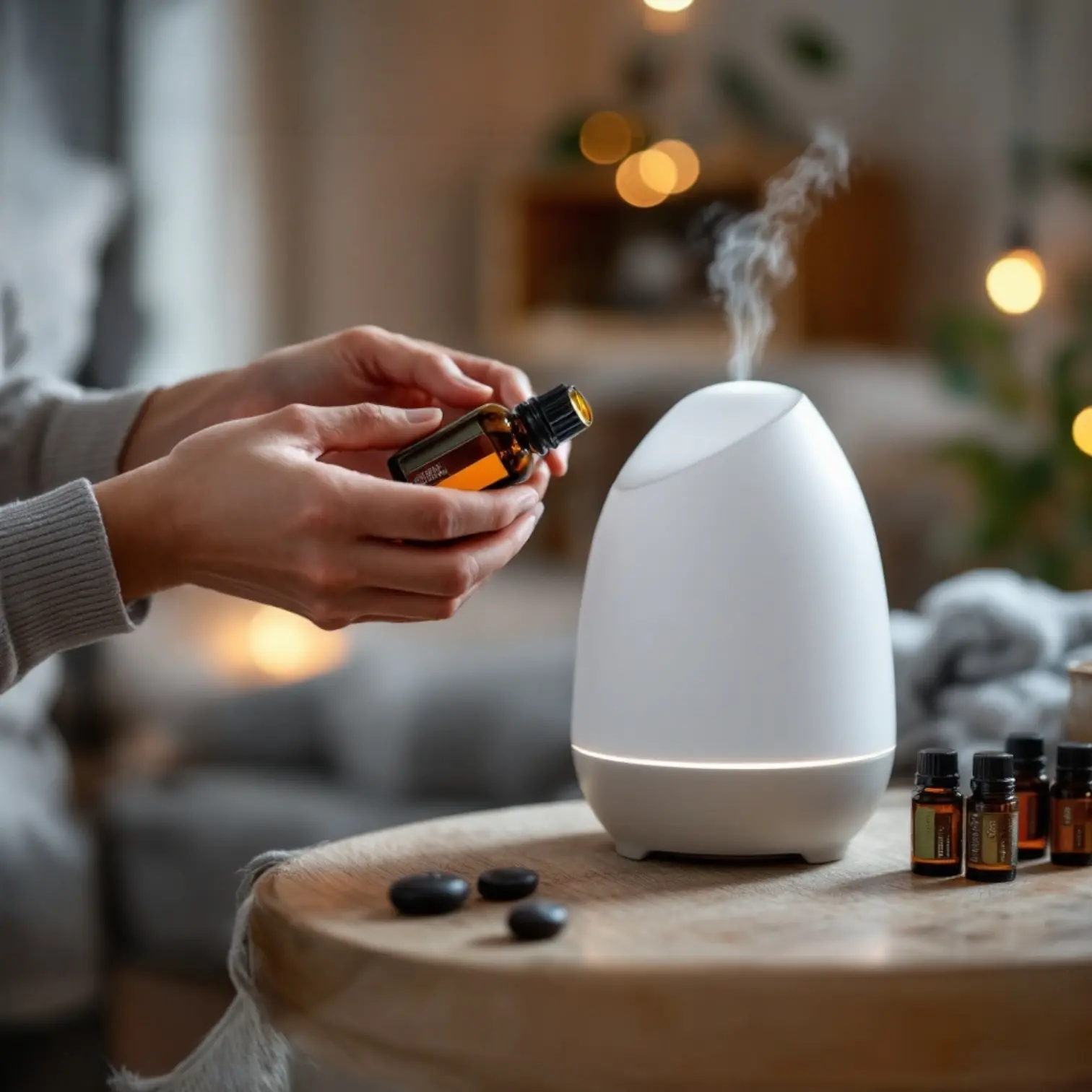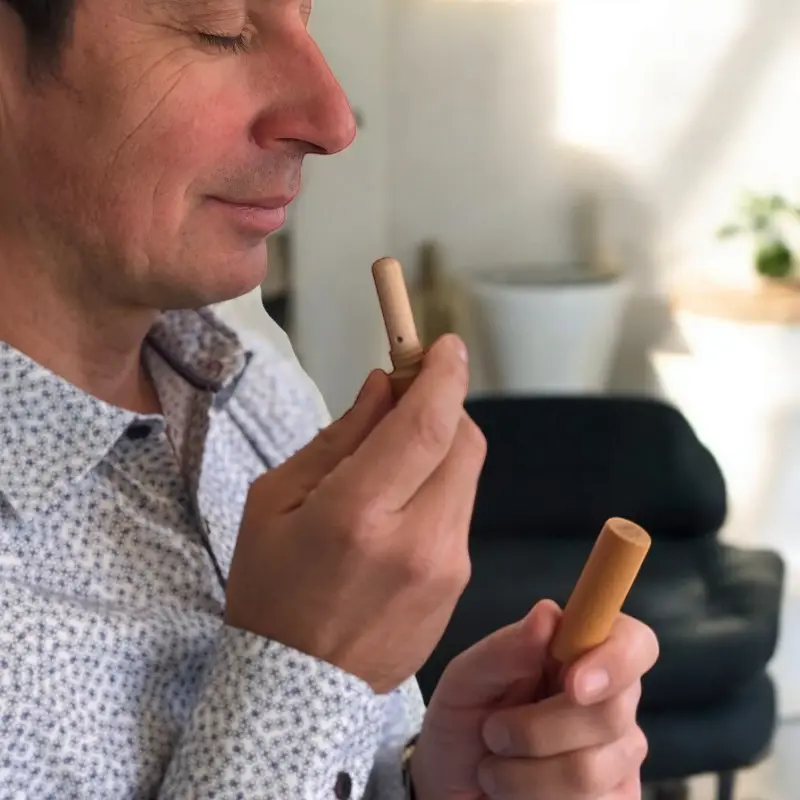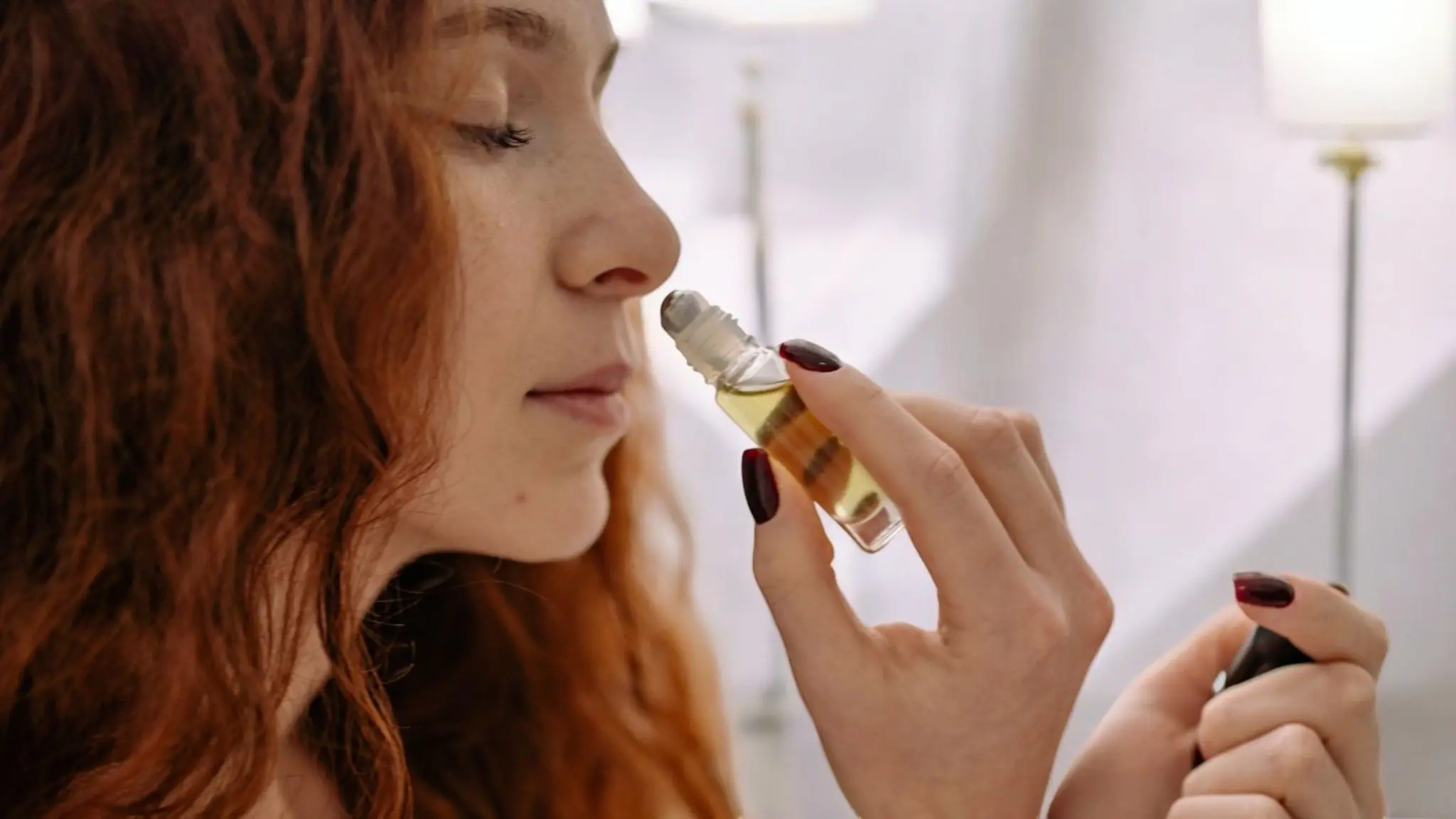Sophrology and Aromatherapy, two complementary practices, offer a global approach to promote physical and emotional well-being. Combining mental relaxation and the benefits of plants, these disciplines meet various needs: calming, stimulation, stress management or emotional balance. This article explores their synergy and offers practical keys to integrating essential oils into Sophrology sessions.
Sophrology: A psychocorporeal method
Created in the 1960s by Alfonso Caycedo, Sophrology is a method of relaxation and personal development that aims to Harmonize the Body and Mind. It helps to manage stress, improve self-confidence, develop better self-knowledge and relieve certain physical and emotional tensions. There are two currents of Sophrology: Caycedian Sophrology (Alfonso Caycedo) and Dynamic Sophrology (Yves Davrou). These are two different approaches, however, they pursue the same goal: Harmonize the Body and Mind to improve general well-being. They differ in the way they achieve this:
- Caycedian Sophrology is more structured, with specific protocols to treat particular disorders (stress, anxiety, pain).
- Dynamic Sophrology is more flexible and focused on personal development, with an emphasis on stress management and daily well-being, it is intended to be accessible to all.

Essential Oils: An ideal synergy with Sophrology
Essential oils are concentrated plant extracts from plants, trees or flowers, known for their therapeutic virtues. They have specific properties depending on their biochemical composition, such as soothing, energizing, anti-stress or regenerating effects. When integrated into a sophrology session, they can accentuate the relaxing and therapeutic effect of the method.
Aromatherapy: Why combine essential oils with Sophrology?
- Emotional grounding: Essential oils work on the limbic system, facilitating relaxation and connection to emotions.
- Stimulation of the senses: Pleasant smells promote a meditative state and amplify bodily sensations.
- Positive memory: An essential oil associated with a moment of well-being can be reused in everyday life to find this state again.
How to integrate essential oils into Sophrology?
There are several methods for using essential oils during a session:
- Atmospheric diffusion :

Before the session, diffuse an essential oil in the room to create an atmosphere conducive to relaxation. - Direct inhalation :

With a personalized olfactory stick, participants can inhale an essential oil to promote concentration or calm.
- Skin application :

Using a roll-on on specific points (wrists, temples, plexuses) can reinforce the effects of sophrology.
- Olfactory associations :

During positive visualization exercises, an essential oil can be used to anchor a pleasant emotion or memory. This scent will then become a positive anchor to be reused.
Essential oils suitable for Sophrology sessions
1. Soothing and Relaxing Essential Oils
These oils are particularly recommended for reducing stress, relieving tension and promoting a state of deep relaxation, essential during a sophrology session.
True Lavender (Lavandula angustifolia)
- Properties: It is one of the most known and used essential oils in aromatherapy. It is ideal for its calming, relaxing and sedative effects. It helps reduce anxiety, nervousness and intrusive thoughts.
- Why it is useful in sophrology: Lavender helps lower the heart rate, relax the muscles and calm the mind. It is a perfect ally to initiate a sophrology session and immerse yourself in a state of relaxation..
Ylang-Ylang (Cananga odorata)
- Properties: This oil has soothing and balancing properties. It helps reduce stress, relieve anxiety and bring a sense of inner peace..
- Why it is useful in sophrology: Ylang-Ylang helps to release emotional tensions and restore balance, which allows better management of emotions during the practice of sophrology.
Roman Chamomile (Chamaemelum nobile)
- Properties: Well known for its calming effects, Roman Chamomile is a soothing essential oil that helps relieve emotional disorders such as anxiety and nervousness..
- Why it is useful in sophrology: It promotes mental and physical relaxation, creating a state conducive to meditation and positive visualization. It is also ideal for calming the mind during sessions..
2.Stimulating and Energizing Essential Oils
Some essential oils are particularly useful when you want to increase your energy, strengthen your concentration or stimulate motivation. They are often used for sophrology sessions aimed at revitalizing the mind and body..
Peppermint (Mentha piperita)
- Properties: It is an energizing, stimulating and refreshing essential oil. It is ideal for improving mental clarity and stimulating attention.
- Why it is useful in sophrology: It helps to awaken the mind, increase concentration and dissipate mental fatigue. Perfect for sessions where you are looking to improve concentration or to energize yourself after a period of stress.
Cineol Rosemary (Rosmarinus officinalis cineoliferum)
- Properties: Rosemary essential oil is known for its stimulating, revitalizing and detoxifying properties. It stimulates cognitive abilities and helps improve concentration..
- Why it is useful in sophrology: It can be used for concentration and mental clarification exercises, as well as to improve memory. It is also an ideal oil to invigorate and strengthen vital energy during sessions..
Lemons or Citrus (Citrus limon)
- Properties: Citrus fruits, such as Lemon, Sweet Orange or Mandarin, are comforting, energizing and invigorating oils..
- Why they are useful in sophrology: These oils bring an immediate positive effect, creating a state of joy and mental clarity. They are very effective in improving mood, dispelling negative thoughts and promoting an energetic dynamic of well-being..
3. Anti-Stress and Anti-Anxiety Essential Oils
When the goal of the session is to manage anxiety, tension or excessively strong emotions, certain essential oils stand out for their ability to reduce mental and emotional agitation..
Shelled Marjoram (Origanum majorana)
- Properties: This essential oil is very famous for its relaxing, sedative and calming properties. It is particularly effective against stress and anxiety..
- Why it is useful in sophrology: Marjoram promotes a feeling of inner security and grounding. It helps to soothe disturbed emotions and release deep tensions, thus creating a climate conducive to relaxation and rest.
Bergamot (Citrus bergamia)
- Properties: Bergamot essential oil is known for its antidepressant and relaxing effects. It is often used to combat anxiety and mood disorders..
- Why it is useful in sophrology: Bergamot helps reduce mental stress while providing a feeling of lightness and optimism. It can be used to facilitate relaxation and positive visualization exercises..
Neroli (Citrus aurantium)
- Properties: Neroli is a gentle, soothing and comforting oil, ideal for reducing anxiety and emotional tension.
- Why it is useful in sophrology: It creates a climate of deep calm and promotes muscle relaxation while providing a feeling of well-being. Neroli is particularly effective for people suffering from chronic stress or emotional disturbances.
4. Essential Oils for General Well-being
Some essential oils combine relaxing, stimulating and balancing effects, suitable to support the entire practice of sophrology.
Frankincense (Boswellia carterii)
- Properties: Frankincense is an oil traditionally used for its ability to meditate deeply and its ability to calm the mind.
- Why it is useful in sophrology: It promotes a spiritual connection, calms the mind and helps create a sacred and soothing atmosphere, facilitating concentration and deep relaxation.
Rosat Geranium (Pelargonium graveolens)
- Properties: Geranium Rosat is an oil that balances emotions, reduces anxiety and soothes physical and mental tensions..
- Why it is useful in sophrology: It helps to regain emotional balance and release tensions that block energy, thus creating harmony between body and mind during the session..
Precautions for use of essential oils
The use of essential oils requires special precautions:
- Oil Quality: Choose 100% Pure and Natural Essential Oils.
- Appropriate dosages: Respect the recommended doses to avoid irritations or allergies.
- Contraindications: Certain oils are not recommended for pregnant women, children or people suffering from certain pathologies (asthma, epilepsy, hormone-dependent cancer).
- Allergy test: Before use, apply a drop of diluted essential oil to the crease of the elbow to check for any reaction. If necessary, dilute in a vegetable oil.
Course of a Sophrology Session with Essential Oils
A typical sophrology session with essential oils generally takes place as follows::
- Welcome and explanation: The sophrologist takes the time to know the needs and expectations of the person. He can ask a few questions about his emotional state, his concerns and his well-being objectives.
- Choice of essential oils: Depending on the needs, the sophrologist will choose one or more essential oils. These oils can be diffused in the air using a diffuser, applied in a light massage on specific points of the body or simply inhaled.
- Relaxation exercises: The session begins with deep breathing and dynamic relaxation exercises to release physical tension. Essential oils accompany these exercises to reinforce the relaxing effect.
- Positive visualization and meditation: Once the body is relaxed, visualization or meditation exercises are proposed, often guiding the person to imagine soothing landscapes or well-being situations. The smell of essential oils reinforces this visualization, amplifying the serenity effect..
- Conclusion of the session: The session ends with a return to calm and inner balance. The person is invited to express their feelings and share their experience during the session. The sophrologist may also recommend the regular use of essential oils at home to prolong the benefits of the session..
Conclusion
Sophrology combined with aromatherapy offers a holistic and personalized approach. This alliance:
- Strengthens relaxation and the meditative state.
- Allows powerful emotional anchoring via olfactory memories.
- Offers practical and reusable tools in the daily lives of participants.
This method is particularly appreciated in the context of stress management, mental preparation or even to support periods of transition.
Want to take part in an olfactory journey during a session? Don't hesitate to contact us to make an appointment +32 470 33 53 63
Bibliography:
- Baudoux, D. (2017). "Aromatherapy: Healing with essential oils". Amyris Editions..
- Béhar, C., Gérault, G., Sommerard, C. (2011). "Le Guide de l'ofactothérapie: Les huiles essentielles pour soigner notre corps et accompagner nos émotions". Ed. Albin Michel
- Caycedo, A. (1997). "Sophrology: Method and applications". University Press.
- FAUCON, M. (2023), "Sensory approaches in aromatherapy: Use of psycho-emotional essential oils in care", Ed Dunod
- GEA, A. (2022), "Physiology and essential oils, How do essential oils act on the different systems of the body?", Ed. Dunod
- JAFFRELO, A-L. (2021), “Essential oils to smell and feel”, Ed. Alternatives
- Servan-Schreiber, D. (2003). Healing: Stress, Anxiety and Depression without Medication or Psychoanalysis. Editions Robert Laffont.
- Valnet, J. (1990). Aromatherapy: Treatment of diseases by plant essences. Maloine.



Sophrology and Aromatherapy: The Art of Combining Essential Oils During Sessions